(!)Due to Microsoft's end of support for Internet Explorer 11 on 15/06/2022, this site does not support the recommended environment.
50,000 Stock items for Same Day Ship Out.
All Categories
Categories
- Automation Components
A wide variety of standard and configurable components for factory automation engineers in industries such as automotive, semiconductor, packaging, medical and many more.
- Linear Motion
- Rotary Motion
- Connecting Parts
- Rotary Power Transmission
- Motors
- Conveyors & Material Handling
- Locating, Positioning, Jigs & Fixtures
- Inspection
- Sensors, Switches
- Pneumatics, Hydraulics
- Vacuum Components
- Hydraulic Equipment
- Discharging / Painting Devices
- Pipe, Tubes, Hoses & Fittings
- Modules, Units
- Heaters, Temperature Control
- Framing & Support
- Casters, Leveling Mounts, Posts
- Doors, Cabinet Hardware
- Springs, Shock Absorbers
- Adjusting, Fastening, Magnets
- Antivibration, Soundproofing Materials, Safety Products
- Fasteners
A good selection of accessories such as screws, bolts, washers and nuts that you may need for your daily engineering usage.
- Materials
Browse industrial materials ranging from heat insulating plates, sponges, to metal and plastic materials in different sizes to meet your various applications.
- Wiring Components
A wide variety of wiring parts for connecting and protecting control and PC parts including Connectors, Cables, Electric Wires, Crimping Terminals and more.
- LAN Cables / Industrial Network Cables
- Cables by Application
- Cables with Connectors
- RS232 / Personal Computers / AV Cables
- Wires/Cables
- Connectors (General Purpose)
- Crimp Terminals
- Zip Ties
- Cable Glands
- Cable Bushings/Clips/Stickers
- Screws/Spacers
- Cable Accessories
- Tubes
- Protection Tubes
- Ducts/Wiremolds
- General Purpose Tools
- Dedicated Tools
- Soldering Supplies
- Electrical & Controls
A wide variety of controls and PC parts for electrical engineers including Controls, Powers, PC parts and more.
- Cutting Tools
A wide variety of cutting tools for many uses and work materials including End Mills, Drills, Cutters, Reamers, Turning Tools and more.
- Carbide End Mills
- HSS End Mills
- Milling Cutter Inserts/Holders
- Customized Straight Blade End Mills
- Dedicated Cutters
- Turning Tools
- Drill Bits
- Screw-Hole-Related Tools
- Reamers
- Chamfering / Centering Tools
- Fixtures Related to Cutting Tools
- Step Drills
- Hole Saws
- Clean Key Cutters
- Core Drills (Tip Tools)
- Magnetic Drilling Machine Cutters
- Drill Bits for Electric Drilling Machines
- Woodworking Drill Cutters
- Drills for Concrete
- Processing Tools
A wide variety of tools and supplies used in processing including Machine Tools, Measurement Tools, Grinding and Polishing Supplies and more.
- Material Handling & Storage
A wide variety of goods used in shipment, material handling and warehouse including Tape supplies, Stretch film, Truck, Shelf, Crane and more.
- Tape Supplies
- Cushioning Materials
- Stretch Films
- Cardboard
- Plastic Bags
- PP Bands
- Magic Tapes / Tying Belts
- Rubber Bands
- Strings/Ropes
- Cable Ties
- Tags
- Labelers
- Unpacking Cutters
- Packing Support Equipment
- Cloth Sheets for Packing
- Conveyance/Dolly Carts
- Tool Wagons
- Tool Cabinets / Container Racks
- Lifters / Hand Pallets
- Container Pallets
- Storage Supplies
- Shelves/Racks
- Work Benches
- Suspended Clamps/Suspended Belts
- Jack Winches
- Chain Block Cranes
- Bottles/Containers
- Bicycle Storage Area
- Safety & General Supplies
A large variety of goods for every kind of factories and offices including Protection items, Cleaning supplies, sanitations, office supplies and more.
- Lab & Clean Room Supplies
A large variety of items used in R&D and Clean Room including research Equipment, Laboratory Essentials, Analysis Supplies, Clean Environment-Related Equipment and more.
- Press Die Components
Choose from thousands of standard stamping die components including Punch & Die, Gas Springs, Guide Components, Coil Springs and many more.
- Plastic Mold Components
Browse our wide variety of mold components including Ejector Pins, Sleeves, Leader Components, Sprue Bushings and many more.
- Ejector Pins
- Sleeves, Center Pins
- Core Pins
- Sprue bushings, Gates, and other components
- Date Mark Inserts, Recycle Mark Inserts, Pins with Gas Vent
- Undercut, Plates
- Leader Components, Components for Ejector Space
- Mold Opening Controllers
- Cooling or Heating Components
- Accessories, Others
- Components of Large Mold, Die Casting
- Injection Molding Components
Browse our injection molding components including Heating Items, Couplers, Hoses and more.
- Purging Agent
- Injection Molding Machine Products
- Accessories of Equipment
- Auxiliary Equipment
- Air Nippers
- Air Cylinders
- Air Chuck for Runner
- Chuck Board Components
- Frames
- Suction Components
- Parallel Air Chuck
- Special Air Chuck
- Chemical for Injection Molding
- Mold Maintenance
- Heating Items
- Heat Insulation Sheets
- Couplers, Plugs, One-touch Joints
- Tubes, Hoses, Peripheral Components
Search by Application
Brands
- Scheduled Maintenance Notice: This site will be unavailable due to scheduled maintenance from 9:00 24/11/2024 to 7:00 (MYT) 25/11/2024. We apologize for the inconvenience.
- Notice of End of Sales for Economy Series Pneumatic Equipment Category. More information.
- Please note that E-Invoice will be sent to our customers by email. For more information, please read News.
Chains Nominal No.60/Joint Link
- Volume Discount
- Chains Nominal No.60/Joint Link from MISUMI.
- This chain type is economy series of standard chains.
- Chain nominal No. is 60 while pitch No. is 19.05 mm.
- Max. Allowable Tension of chain is 8.83 kN.
- Can be selected fixed type which the number of chain links is 80 links, circumference length is 1,524mm. Or configurable type which can be configured 4 to 9998 links (2 links increment).
- Chains are made of steel.
- This series is ISO Standard 12A (ANSI 60) roller chain and can be used in combination with our 60B series sprocket.
Part Number
Configured Part Number is shown.
Economy Chains Nominal No.60/Joint Link
- Choose from fixed or customizable configurations to accommodate diverse industrial needs with precision.
- High Tension Capacity: With a maximum allowable tension of 8.83 kN, this chain is engineered to handle substantial loads, ensuring reliable performance in demanding applications.
- Conforms to standards for compatibility with MISUMI’s products.
- Constructed from robust steel, promising durability in high-temperature environments.
- Ideal for both power transmission and workpiece transfer, offering versatile solutions.
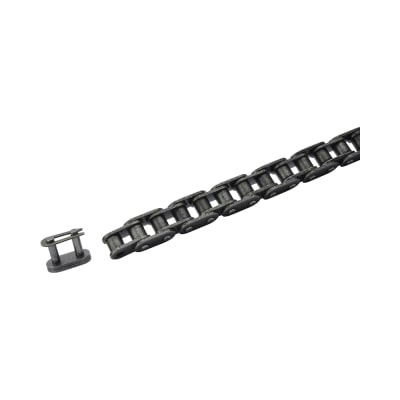

![]()
MISUMI Standard
![]()
Cheaper Price
![]()
Product Variety
![]()
3D CAD Support
Product Overview of Chains
■Only sprockets and Chains with the same specifications can be used in combination.
This series is ISO Standard 12A (ANSI 60) roller Chains, and can be used in combination with our 60B series sprocket. Do not use it with European Standard 12B sprocket, which may cause the Chains sprocket mechanism to fail to function properly!
■ Product Composition of Chains
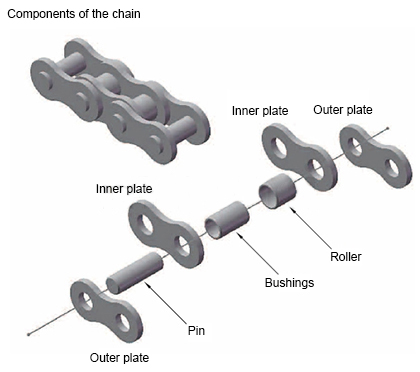
Dimensional Drawing of Chains
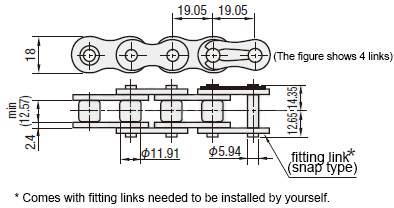
 Material: Steel
Material: SteelSpecifications Overview of Chains
This series is ISO Standard 12A (ANSI 60) roller Chains, and can be used in combination with our 60B series sprocket. Do not use it with European Standard 12B sprocket, which may cause the Chains sprocket mechanism to fail to function properly!

Product Feature of Chains
1. Multi-tooth load bearing, safe and reliable;
2. Flexible transmission, absorbing shock and vibration;
3. Large center distance range, low manufacturing and mounting accuracy requirements;
4. Compared with belt drive, the transmission ratio is accurate and the transmission efficiency is higher, suitable for high temperature.
■Two main purposes of the Chains:
1. Connect the motor for transmission 2. Place the workpiece directly or indirectly on the Chains for transfer
Example Use of Chains
A mechanism that can convert motor power into roller rotation by combining multiple sprockets and Chains
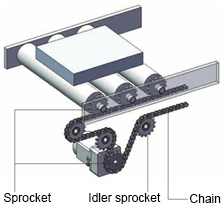
A chain conveyor frame with high versatility using flat profiles and Chains guides

A mechanism used to mount accessories on the Chains, and extract and transport workpieces
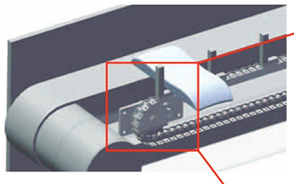
Precautions of Chains
If you need to cut the chain by yourself, please confirm whether the chain link to be cut is an inner link or an outer link. If it is a single section after being cut off, it may need to be used with an offset link head.
Usage Method of Chains
■Horizontal
Even when the two axes are arranged horizontally, the rotation direction of the axis must be considered.
The examples (2) and (3) in the figure show that when the Chains is stretched, the disengagement between the sprocket teeth and the chain is not smooth and may bite.
In particular, the upper and lower chains in (3) will contact each other, so an idler is required.
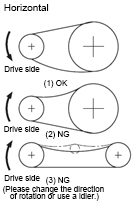
If the Chains is stretched, slack as shown in (5) will occur, and
when a small sprocket is used on the lower side, the chain may fall off. Therefore, please use it at an angle of 60 or less as shown in (4).
When it is necessary to use it vertically due to the mechanism or space, it is recommended to put the large sprocket on the lower side, and
use the idler on the outside or inside as shown in (6).

Deflection is generally about 4% of the shaft spacing, and about 2% in the following cases.
a. Vertical transmission or close to vertical transmission
b. Shaft spacing is more than 1m
c. When frequent heavy load starting and stopping are required
d. When reverse rotation is required

If a tension adjuster is mounted on the tension side or slack side of the Chains to provide initial tension in advance, it will eliminate vibration and reduce noise during operation.

Related Products of Chains
 |
| Sprocket 60B |
Part Number
CAD Data download and 3D preview are not available because the part number has not yet been determined.
- *In order to open the CAD Data download and 3D preview screen, the part number must be fixed.
- Please confirm the part number from "Specification / Dimension"on the left side, and then perform the CAD Data Download / 3D Preview operation.
| Part Number |
|---|
| C-CHE60-80 |
| C-CHE60-[4-9998/2] |
| Part Number | Standard Unit Price | Minimum order quantity | Volume Discount | Days to Ship | Type | Number of Links (pc(s).) | Number of Links (Units) |
|---|---|---|---|---|---|---|---|
MYR 68.91 | 1 Piece(s) | Available | 1 Day(s) | Fixed Number of Knots | 80 | - | |
- | 2 Piece(s) | 14 Day(s) | Specified Number of Knots | - | 4 ~ 9998 |
Loading...
Basic Information
| Type | Standard Chains | Nominal Number | 60 | Pitch | 19.05 |
|---|---|---|---|---|---|
| Number of Strands | 1 | Material | Steel | Surface Treatment | Not Provided |
| Max. Allowable Tension(kN) | ~99 |
- The specifications and dimensions of some parts may not be fully covered. For exact details, refer to manufacturer catalogs .
Frequently asked question (FAQ)
- Question: I bought MISUMI chains, but why can't I use them on my original sprocket?
- Answer: Please confirm the specifications of the original sprocket and chain. Specification series number may not match. In addition, there are two specifications: A series and B series in China. The two specifications of sprocket chain are not universal.
- Question: Does the chain need routine maintenance after installation and use?
- Answer: The chain needs regular maintenance after installation and use. These include daily lubricant application, confirmation of chain slack. The quality of lubrication will affect the life of the chain. Especially in recent years, high-speed use has been increasing, so it is necessary to take efficient lubrication methods.
- Question: Does the chain purchased come with joints, and if any, how many joints?
- Answer: In principle, one chain comes with one joint. If the customer needs multiple joints to use, you can buy it yourself, we have separate joints to choose from. Please refer to the chain type when purchasing joints.
- Question: How to use the carrier chain?
- Answer: The carrier chain can only be used for transmission, not for scenarios with large load and high positioning accuracy, please be careful!
- Question: Can the chain be cut off when it is extended?
- Answer: It can be cut off. Our company has simple chain cutter available for selection.
Additional Products in this Category
- Chains Nominal No.25/Joint Link
- Chains Nominal No.50/Joint Link
- Standard Roller Chain (TYC)
- Roller Chain, Roll Brush (Sintering Chain) TS Type (For Driving)
- Chain, Fitlink Roller Chain (Standard Roller Chain) Four-Rows
- Offset Link EA967E-29
- Roller Chain [Stainless Steel] EA967EG-25
- Joint Link (Oilless /2 pcs) EA967EH-260


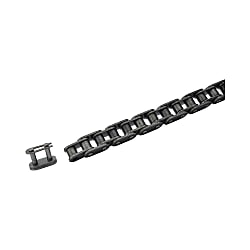
How can we improve?
How can we improve?
While we are not able to respond directly to comments submitted in this form, the information will be reviewed for future improvement.
Customer Privacy Policy
Thank you for your cooperation.
While we are not able to respond directly to comments submitted in this form, the information will be reviewed for future improvement.
Please use the inquiry form.
Customer Privacy Policy